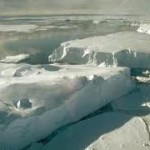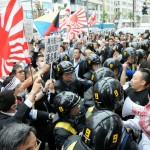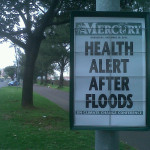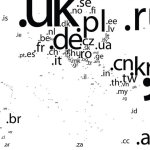- DETERRENCE: Command and Control: Nuclear Weapons, the Damascus Accident, and the Illusion of Safety
- DPRK: North Korea Restarting its 5MW Reactor
- ENERGY SECURITY: Arctic Sea Ice Melting Faster Than Expected, UN Report Finds
- GOVERNANCE AND CIVIL SOCIETY: Japan Grapples with Rise in Hate Groups
- CLIMATE CHANGE ADAPTATION: Floods in the WHO European Region: Health Effects and their Prevention
- AUSTRAL PEACE AND SECURITY: Australia’s Role in an American Internet,
 DETERRENCE: Command and Control: Nuclear Weapons, the Damascus Accident, and the Illusion of Safety, E. Schlosser, Penguin, New York, 2013
DETERRENCE: Command and Control: Nuclear Weapons, the Damascus Accident, and the Illusion of Safety, E. Schlosser, Penguin, New York, 2013
Human fallibility, scale, and technological complexity inevitably mean whatever can go wrong eventually will go wrong. Schlosser focuses on the “always/never” dilemma: “Ideally, a nuclear weapon would always detonate when it was supposed to — and never detonate when it wasn’t supposed to”.
- U.S. Air Force Tactical Missiles 1949-1969, The Pioneers, G. Mindling and R. Bolton, Lulu Press, 2008
- MRBM’s in the Pacific: Ballistic Systems Division and Aerospace Corporation, Air Force Systems Command, June 15, 1965, FOIA Document NAPSNet Special Reports, July 17, 2012
- Instabilities in the Control of Nuclear Forces, Paul Bracken, in A. Gromyko, M. Hellman, ed, Breakthrough, Emerging New Thinking, Walker and Company, New York, 1988
 DPRK: North Korea Restarting its 5MW Reactor, 38 North, (11 September 2013)
DPRK: North Korea Restarting its 5MW Reactor, 38 North, (11 September 2013)
North Korea continues to act in seemingly contradictory ways that but that are an established pattern of asserting sovereignty. North Korea – for the first time – raised Taegukki, the South Korean flag, and played South Korea’s national anthem. North Korea also allowed operations at Kaesong Industrial Complex to resume and is interested in restarting nuclear talks. At the same time, North Korea is restarting a 5 Mwe gas-graphite plutonium production reactor.
- South Korean Flag Raised in North Korea for the First Time, (China) People’s Daily online, (15 September 2013) [Chinese language]
- South Koreans Head Back North to Reopened Kaesong Complex, Associated Press, The Guardian, (15 September 2013)
- China Urges U.S. to Quickly Return to Nuke Talks with North Korea, Global Security Network, (16 September 2013)
 ENERGY SECURITY: Arctic Sea Ice Melting Faster Than Expected, UN Report Finds, Pilita Clark (18 September 2013), Financial Times (registration required)
ENERGY SECURITY: Arctic Sea Ice Melting Faster Than Expected, UN Report Finds, Pilita Clark (18 September 2013), Financial Times (registration required)
FT reports on a leaked draft of an IPCC study claiming, “A nearly ice-free Arctic Ocean in September before mid-century is likely.” Daily Mail alleges that the draft Summary for Policy Makers for Working Group 1 retracts some previous claims, even as it supposedly claims that the authors are “95 per cent certain – that human influence caused more than half the temperature rises from 1951 to 2010, up from ‘very confident’ – 90 per cent certain – in 2007.”
- Leaked IPCC report discussed in the MSM (mainstream media) Judith Curry (on blog Climate plus) [15 September 2013] reflecting on her interview by the Daily Mail for the story World’s top climate scientists confess: Global warming is just QUARTER what we thought – and computers got the effects of greenhouse gases wrong, David Rose, Daily Mail (UK) [14 September, revised 17 September 2013]
- Ahead of IPCC climate report, skeptic groups launch global anti-science campaign, Katherine Bagley, InsideClimate News [18 September 2013]
 GOVERNANCE AND CIVIL SOCIETY: Japan Grapples with Rise in Hate Groups, Michael Penn, The Real News (11 September 2013)
GOVERNANCE AND CIVIL SOCIETY: Japan Grapples with Rise in Hate Groups, Michael Penn, The Real News (11 September 2013)
Anti-Korean sentiment has been on the rise over the past year in Japan. Protests by hate groups followed Tokyo’s Olympic bid win, calling for a break in relations. Japan’s government has also faced criticism on its treatment of students in schools in Japan with ties to the DPRK. A ROK NGO will launch the Korea-China Peace Project, a Chinese language site dedicated to the historical issues between the ROK, PRC and Japan.
- Korea-China Peace Project: VANK Opens Chinese Language Website for Historical Awareness of Japanese Crimes, Business Korea (12 September 2013)
- Nationalism Rearing Ugly Head with Greater Frequency, Tomohiro Osaki, Japan Times (23 May 2013)
- Separate and Unequal? Amid Political Tensions, Pro-North Korea Schools in Japan Face Ostracism, Eric Talmadge, Associated Press (24 August 2013)
 CLIMATE CHANGE ADAPTATION: Floods in the WHO European Region: Health Effects and their Prevention, Bettina Menne and Virginia Murray (editors), World Health Organization-Regional Office for Europe (2013)
CLIMATE CHANGE ADAPTATION: Floods in the WHO European Region: Health Effects and their Prevention, Bettina Menne and Virginia Murray (editors), World Health Organization-Regional Office for Europe (2013)
Physical resilience of the built environment is important in the prevention of health impacts resulting from floods–both in the short and long term. Various strategies can be adopted for making new buildings more resistant to flood or retrofitting buildings at risk. For settings with high flood risk, resiliency and resistance measures are highly economically worthwhile.
- An Attempt to Quantify the Health Impacts of Flooding in the United Kingdom Using an Urban Case Study, Lorna Fewtrell and David Kay, Public Health, vol. 122, issue 5, pp. 446-451 (2008)
- Health Effects of Climate Change in the UK 2012: Current Evidence, Recommendations and Research Gaps, Sotiris Vardoulakis and Clare Heaviside (editors), UK Health Protection Agency (2012)
 AUTRAL PEACE AND SECURITY: Australia’s Role in an American Internet, James Turner, Australian Financial Review (17 September 2013)
AUTRAL PEACE AND SECURITY: Australia’s Role in an American Internet, James Turner, Australian Financial Review (17 September 2013)
The world has entrusted huge amounts of sensitive data to the safekeeping of US cloud providers. Snowden’s NSA revelations raise concerns about potentially compromised commercial information in Australia: the NSA seems to have lost control over its own data, and NSA insiders could potentially abuse their access for commercial gain. This has been the most extensive, and expensive, breach of corporate data Australia has experienced to date, and agencies have not disclosed details to the Australian public.
- US Shares Raw Intelligence on Australians with Israel, Philip Dorling, Sydney Morning Herald (12 September 2013)
- Michael J. Lostumbo et al, Overseas Basing of U.S. Military Forces: An Assessment of Relative Costs and Strategic Benefits, Report Prepared for the Office of the Secretary of Defense, RAND Corporation (2013)
- Housing for US Marines to be Built at ADF Bases, Lorraine Davies, ABC News 11 September 2013
The Nautilus Peace and Security Weekly Report presents articles and full length reports each week in six categories: Austral security, nuclear deterrence, energy security, climate change and security, the DPRK, climate change adaptation and governance and civil society. Our team of contributors carefully select items that highlight the links between these themes and the three regions in which our offices are found—North America, Northeast Asia, and the Austral-Asia region.
Subscribe to NAPSNet to receive free weekly email reports
Editor
- Saegan Swanson (while Arabella Imhoff is on leave)
Contributors
- Deterrence: Peter Hayes
- Governance and Civil Society: Dyana Mardon
- Climate Change Adaptation: Saleem Janjua
- DPRK: Roger Cavazos
- Energy Security: Nikhil Desai
- Austral Peace and Security: Richard Tanter

